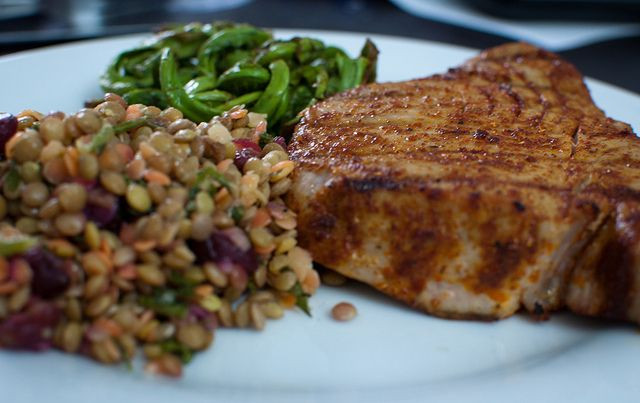High-Protein Diet Can Aid Cardiovascular Health As Much As Quitting Smoking, Getting Exercise

When you’re looking to lose weight or build lean muscle, most experts will tell you to increase your protein intake. That means more chicken, fish, steak, even drinking protein shakes or eating protein bars. Bonus: This high-protein diet may even be better for weight loss than counting calories — but is there more? A new study has found that eating foods high in amino acids can boost cardiovascular activity as much as quitting smoking or getting more exercise.
Researchers from the University of East Anglia (UEA) investigated the effect of several amino acids on cardiovascular health in nearly 2,000 women with a healthy body mass index (BMI). Using data from TwinsUK, the biggest UK adult twin registry used to study the genetic and environmental causes of age-related disease, the researchers studied and compared the women’s diets to clinical measures of blood pressure and blood vessel thickness and stiffness. They ultimately wanted to find out if protein from animals or plants was more beneficial.
"Increasing intake from protein-rich foods such as meat, fish, dairy, produce, beans, lentils, broccoli, and spinach could be an important and readily achievable way to reduce people's risk of cardiovascular disease,” said lead researcher Dr. Amy Jennings, from UEA's Norwich Medical School. “Results from previous studies have provided evidence that increased dietary protein may be associated with lower blood pressure.”
The researchers studied seven amino acids — arginine, cysteine, glutamic acid, glycine, histidine, leucine, and tyrosine — and found that higher intakes of all seven led to lower measures of blood pressure and arterial stiffness, depending on where those high levels of amino acids came from. For example, a higher intake of plant-based food was associated with lower blood pressure, while a higher intake of animal protein led to lower levels of arterial stiffness.
“The really surprising thing that we found is that amino acid intake has as much of an effect on blood pressure as established lifestyle risk factors such as salt intake, physical activity, and alcohol consumption,” Jennings said. As for arterial stiffness, the association was similar to the one previously attached to not smoking.
Changing your diet to include more meat, fish, dairy products, and other sources of protein can be a great way of reducing hypertension, which Jennings says is one of the most potent risk factors for developing cardiovascular disease. Food-wise, “more protein,” is equal to 75 grams of steak, 100g salmon fillet, or a 500-milliliter glass of skim milk.
Source: Jennings A, et al. Amino Acid Intake Is Inversely Associated with Arterial Stiffness and Central Blood Pressure in Women. Journal of Nutrition. 2015.



























